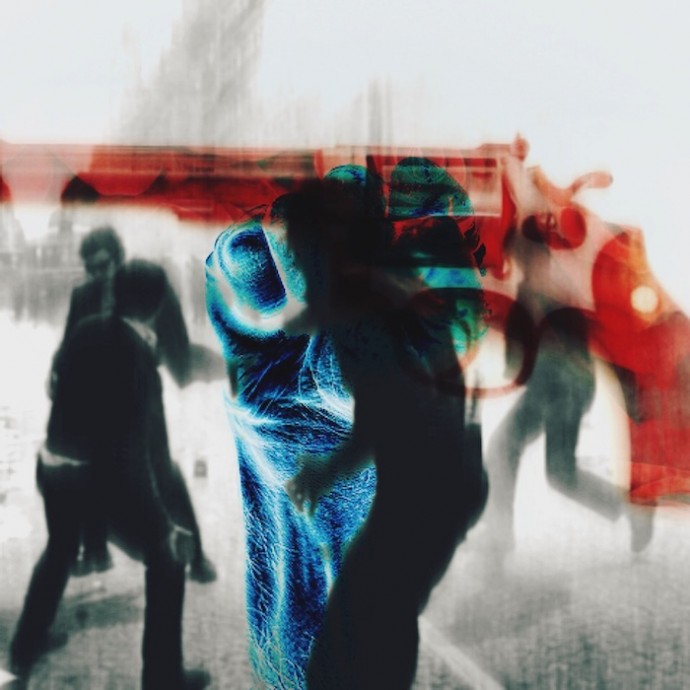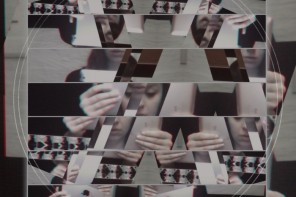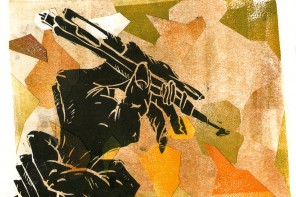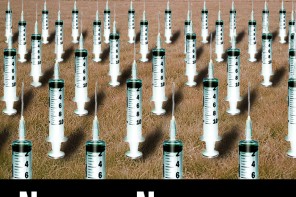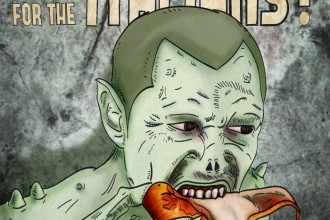In the year 1968 Western Germany exploded into violence. After the shooting of an unarmed student, the young students took to the streets and energetically fought in a campaign that many see as the core intergenerational struggle between the post-WWII children and their parents, who were socialized and educated by the Nazi regime. Clashes were frequent and increasingly bloody, eventually culminating with a fraction of students arming themselves and heading underground. It took ten years of abductions, terrorism, and assassinations until the leaders of the movement committed suicide in their prison cells. Sensa Nostra spoke to a member of the Student Movement whose life archetypically depicts the politicization of a generation.
In 1939, when I was one year old, we moved to Lüneburg in Niedersachsen. It was a city of 60,000 inhabitants, about 60 kilometers from Hamburg, and is still famed for its beautiful, medieval, old town.
Life there was boring and odious.
Like most families in the town, we were bourgeois and middle-class. My father, like many others, had been drafted into the war in 1938. He died in the East. All my mother told me was that he’d been discovered by a comrade, as the defeated German army retreated over the Carpathian Mountains. He’d frozen to death. And thus the dreams of my mother melted like snow in sun. The post-war “economic wonder” touched so many around us, but passed by my family and soured the life of my mother. Her daughters were expected to find a proper husband, with a doctorate if possible, and have children. Our house was apolitical. The only thing I remember of our newspaper are the ice-skating pictures we cut from it.
In 1958 I purchased one of my first records, Crawfish by Elvis. One day, as we all sat at the table, my sister and I put on the title track, “Crawfish! Crawfish,” Elvis began to sing . My mother stood wordlessly from the table, took the record from the player, opened the veranda door, threw the record onto the street, turned to us, and said, “You will not bring this nigger music into my house”. No, I couldn’t stand Lüneburg for very long.
I may have left middle-class Lüneburg as an apolitical girl, but on the 4th May 1967—on that infamous day in Berlin—my middle-class sentiments crumbled. I went to see the Persian Shah, Mohammad Reza Pahlavi, and his wife, Farah Diba, at the German Opera in Charlottenburg. I’d previously worked in the Persian Embassy in Geneva, so I wanted to join in the welcoming of my former employers. I was properly prepared: Fresh from the hairdresser, high heels on, and the buttons of my beautiful petticoat glimmering in the sun.
When I arrived, what I discovered was grotesque. Demonstrators from the Commune 2 and others had arrived with paper bags over their heads, on which the faces of the royal couple had been drawn.
How could they do that? How could they yell “fascist,” “suppressor,” “murderer?” I thought. Don’t lie! That’s all wrong! Suddenly the Shah’s supporters were bashing the protesting students with poles, and then mounted German police began forcefully clearing the demonstration. Someone shouted, “They’re shooting, they’re shooting at us!”. I heard the cry, “One of us has been hit!” and people started to yell, “Run! Get to safety.” Somehow I escaped to the u-bahn. I arrived home totally shocked. I could make neither rhyme nor rhythm of it.
The next day, I comprehensively read the papers with their massive headlines: “The Red Rats against the Persian dynasty,” and I heard the Mayor’s speeches that spoke of the mad student masses: That it was horrible to insinuate that the Shah exploits the Persian population, to talk of secret police suppressing the political opposition.
It was clear that the police had sided with the Persians, rather than protecting their own citizens. The student who’d been shot dead was Benno Ohnesorg. As he fled the scene, he was shot by a plain-clothed police officer. On that day, insights about the German Republic dawned upon me and reminded me of a not-too-distant, fascist era.
Because of this, I became involved in the German student movement. I extended my reading beyond newspapers and became a regular face at demonstrations. We were treated brutally. During a protest against the Vietnam war at the Berlin’s Technical University, mounted police rode into the crowd swinging their clubs, kicking out at any body-part they could land blows. Imagine it! People around me were ridden down and smashed in the face with batons!
I had to become more involved, more engaged. And where was this for women? Typical, it was in teaching! So at the end of my twenties, not wanting to stand around in a bookshop and sell half-witted poems, I became a teacher. I wanted to create the revolution! And the way to do that best was to throw oneself into a social focal point, Ja wohl! I entered a party, the Socialist Unity Party of West Berlin, and a women’s organisation called the Democratic Women’s League of Germany. In 1968 I went into the movement, wanting to change the world.
The Democratic Women’s League recognized the movement had limits. If you look at the old photos, you see men speaking, you see men engaged. But our male comrades had no interest women. He might have happily said, “‘Emancipation,’ but please, not with this woman!” He still wanted his beers brought to him by his wife. That’s when it became clear that, although we fought a revolution, women were secondary.
During this time, feminists emerged, and the feminist movement rifled through the republic. The first debates centered around: “Is it really God-given that we must go around with only one fella?” “Is it really the case that God only wants us to be responsible for children, church, and kitchen?” And then something happened that totally shocked the male world: The pill. At that point the men were defeated—it was bad enough women started to say “how about you clean the toilet,” but now they were saying what they wanted in bed!
*
I often navigate around the question, “What did the Student Movement achieve for contemporary Germany?” Men can answer that. The more interesting question for me is, “What did I do in my life for women?”
Firstly, we managed to liberalise paragraph 218 of the German penal code, stating women cannot be imprisoned for having an abortion. That was a huge success. We also helped enact stricter rape laws—a massive step—and we made rape in marriage punishable. Another success: Women now have access to their own bank account. I also fought so that your husband couldn’t terminate your employment without your consent. Before, he could simply call your employer and say, “She’s not coming in anymore.”
As an educator, I fought against caning, anti-authoritarian upbringing it was called. It was astounding! If you were unlucky, you would go to your father, “whack!” You would go to your mother, “whack!” To your teacher, “whack!” Even your apprenticeship master could plant one on your chin! Today that is a punishable offense. I was there! I contributed! Of course there are still children in this world who get beaten, but I did a lot.
We did so much to make the subversive, humanitarian ideas of people like Heinrich Heine popular. That’s what the revolutionaries wanted. We wanted to make it clear to humanity that happiness existed. To show them to be bold, to be brave, to stand up against the status quo. We wanted to show them that there is a freer, better, braver, more unified world.
But today the student movement is virtually universally condemned. “All of them were mad extremists! All of them the terrorists” seems to be the common view.
Being a leftist, politically active person in Berlin at the time, I met many of them. I met Ulrike Meinhof, and she impressed me. I met Andreas Bader and thought he was an unattractive idiot. Rudi Dutschke? We used to eat pizza with him. I met the lawyers Schilly, Stroebele, and Mahler. It was normal to come into contact with each other. History has since made some of them into how they are known today, but at that time it was nothing special. Joschka Fischer was a taxi driver! If we’d just come from the bar (we generally had just come from a bar), we would say, “Let’s take Joschka’s taxi”.
I don’t reproach the Red Army Faction (RAF) for anything. Not for their bombings, their kidnappings, their shootings—nothing. I understand their desperation and despair. I interpret it as a reaction to the brutality which was heaved upon us. One isn’t allowed to forget the hate, the contempt, the violence. In 1975, I was fired from the school because of my left-leaning politics. Who had been feeding information to the government about me? My own colleagues. You didn’t have to look over the wall to find surveillance and denunciations. You could be shot on any street corner. Rudi Dutschke was shot in the head by a civilian on the street! Kurras, the murder of Benno Ohnesorg, didn’t even go to prison. Was that just?
The media—the Springer Press—would agitate us, calling us “Red Rats,” “Radikalinskis.” In the pocket of Rudi Dutschke’s would-be assassin, they found a cut-out newspaper headline from the tabloid press which read “Rudi Must be Stopped: Now!” Don’t forget this if you want to look at this period critically. We were in the middle of a battle and had no support. People say they were extreme. No. The movement did not fall into extremism. It was the state and the system that was extreme, that challenged us extremely.
Still, I can understand the State’s reaction. I mean, from which generation did our leaders and parents come? We were brought up by men and women who had survived the Second World War, and then brought children into the world. They were damaged people. Think about it: They covered their eyes as millions of their neighbours disappeared into concentration camps; they denounced their Jewish neighbours and then snatched up their property for a few pennies in large auctions; they starved and barely survived in bombed-out cities. Their souls had not healed! And then these broken people, many former Nazis, returned and attained influential positions in government and education.
We stood up against their generation because we understood that they had always lied to us. The uncle of one of my friends used to say, “Everything was great under Rommel. We would fry eggs on the bonnets of our tanks.” The system we fought against, our parents, used measures against us which reflected their experiences. I can understand why the RAF went underground.
But the street movements in the 1960s ended with Rudi Dutschke’s rallying cry to make “the long march through the institutions.” Ulrike Meinhof hung herself, the others also committed suicide, and Holger Meins starved to death. The student pubs, where you would go for your political education, have all since gone. We put down our banners and decided to change things through bureaucratic, political methods—by undercutting the system from within—and between 1990 and 1995 I was an elected representative in Berlin’s House of Representatives.
We never really had a revolution. Comrade Lenin was right when he said, “Revolution in Germany? Even if the Germans wanted to storm a train, they would still buy a ticket”.
*
I fought for a peaceful world, which felt like it dawned on April 30, 1975, when the Americans left Vietnam. We put a lot of blood and broken bones into that becoming a reality. My political aims were to be present when a more peaceful world was being organised, and I was there for the first five years of the new German Republic.
Since then, I have asked, “Why didn’t you take up arms and go underground?” I could have. I spoke about this with Inge Viett, an RAF member imprisoned for years for her part in the abduction of the politician Peter Lorenz. We discussed the difference between us—why she went underground and why I didn’t. My decision had something to do with my childhood in Lüneburg: I was conservative enough to do both. I was at every demonstration and could deal with the risks involved with that sort of political action. But could I had gone somewhere in the Middle East and received weapons training? No, I was brave enough to be part of a comfortable revolution at home.
We didn’t all wake up in the morning, clench our fists and shout, “Now to make the revolution!” I wanted to fight, but I also wanted to drink, dance and shop. A middle-class girl from Lüneburg: what was I going to do in the Middle East?! I mean, could I have taken the drugs I wanted to there? Indeed, we haven’t even discussed the sexual revolution!

